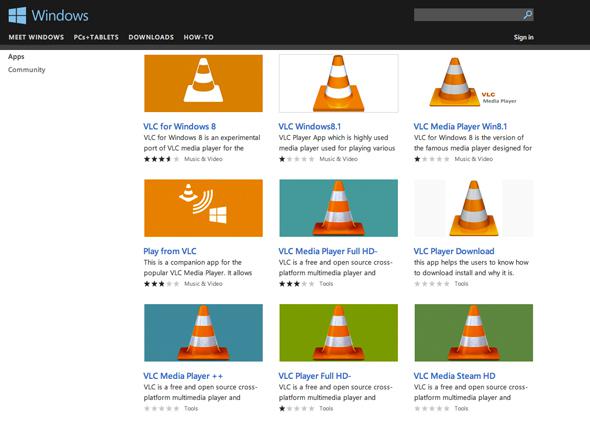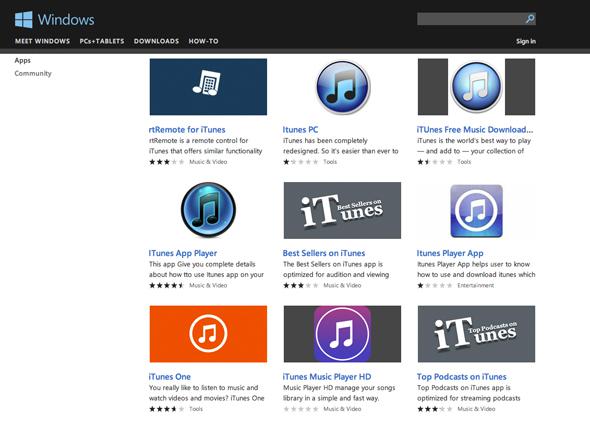Sometimes people—like those who work at Slate—make fun of Windows Phone, because Microsoft’s mobile platform has real problems that hold it back. For one thing, the operating system hasn’t been able to pick up momentum in terms of attracting developers to submit third-party apps. And it seems that, to try to bulk up the number of apps it does offer, Microsoft has gotten too lax about approvals for the Windows Store. There are scams everywhere.
In an investigation, How-To Geek points out that searching for services like popular media player VLC turns up a number of scams alongside the real app. And the fakes look really similar. In the case of VLC, some dummy versions cost money—even though the real software is free—and once a user pays, the fake app just leads them to the free download, or might install malware instead.
As How-To Geek notes, “Within half an hour we managed to find fake paid versions of Adobe Flash Player, Firefox, Pandora, IMDB, Candy Crush Saga, Wechat, WhatsApp, uTorrent, Picasa, Bluestacks, Minecraft, Spotify, Google Hangouts, Picasa, Clash of Clans, Blender 3D, and a lot more.” These are all apps that are supposed to be free (and if you go to the Windows Store now you can try this experiment for yourself). Microsoft hasn’t responded to a request for comment. [Now they have. See update below ]
The worst part: It seems that Microsoft is not only letting these apps through its review process, but has been effectively encouraging them—the company ran a promotion in March 2013, for example, offering developers $100 an app up to $2,000. So if you submitted an amazing app that took you months to create you got $100, and if you submitted 20 lousy scam apps you got $2,000. Not exactly an incentive structure that enourages quality. (How-To Geek points to an Archive.org page about the promotion; it’s gone from Microsoft’s own site.)
In April, Microsoft reported that Windows Phone was boasting 400,000 available apps, but if you search around you’ll quickly see how many of those aren’t genuine. Just for some perspective, Google and Apple’s mobile app counts are both hovering around 1.2 million each right now. Plus both Apple and Google tightly control their stores by putting apps through intensive review and removing anything that gets past them that users later report. Maybe Microsoft is bitter because Windows Phone is the butt of a lot of jokes, but maybe those jokes would die down if the company got better at nurturing its developer community.
Update, August 19, 2014, 3:50 p.m.: A Microsoft spokesperson sent me this statement about the Windows Store spam apps:
We strive to make the Windows Store a high-quality experience for customers and also accessible to the broadest audience of developers. Based on customer and developer feedback, we recently took actions to help users discover the specific app titles they’re searching for and improve the overall Store experience. Those updates provide clear guidance to developers and also improve our ability to identify, audit and remove problematic apps. We recognize that there is more work to do and will continue to re-evaluate our policies to strike a balance between the opportunity for developers and the app quality that our customers expect.
Not exactly a targeted action plan, but at least the company is admitting that there’s an issue here.

Screenshot from the Windows Store
